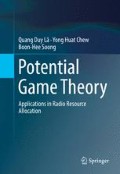Abstract
This chapter investigates the subcarrier allocation problem for a downlink multi-cell multiuser OFDMA network using potential game theory. Each player is considered to be a central base station together with all the mobiles distributed within its coverage area. In such a system, co-channel interferences (CCI), if left uncontrolled, could hinder the transmissions and limit the throughputs of the users, especially those near the cell-edge area. Certain remedies, including power control with pricing, did not seem to solve the problem completely. We specifically address this issue from an interference-minimizing approach, where the utility function adopted is meant to minimize the total CCI among players. Under such a formulation, we show that the formulated game can be mathematically described by a potential game. Hence, a Nash equilibrium will be guaranteed for the proposed game and stable solutions can be achieved via myopic gameplays such as the best/better responses. We propose our iterative algorithm for obtaining the Nash equilibria and address several performance issues such as fairness for edge-users and the price of anarchy. Numerical results show the improvement in efficiency and fairness using this approach.
Access this chapter
Tax calculation will be finalised at checkout
Purchases are for personal use only
References
Ahmadi H, Chew YH, Chai CC (2011) Multicell multiuser OFDMA dynamic resource allocation using ant colony optimization. In: Proceedings of IEEE VTC-Spring, pp 1–5
Bernardo F, Agustí R, Pérez-Romero J, Sallent O (2011) Intercell interference management in OFDMA networks: a decentralized approach based on reinforcement learning. IEEE Trans Syst Man Cybern C Appl Rev 41(6):968–976
Chang RY, Tao Z, Zhang J, Kuo CCJ (2009) Multicell OFDMA downlink resource allocation using a graphical framework. IEEE Trans Veh Technol 58(7):3494–3507
Chee TK, Lim C, Choi J (2006) A cooperative game theoretic framework for resource allocation in OFDMA systems. In: Proceedings of IEEE Singapore international conference on communication systems, pp 1–5
Goldsmith AJ, Chua SG (1997) Variable-rate variable-power MQAM for fading channels. IEEE Trans Commun 45(10):1218–1230
Han Z, Ji Z, Liu KJR (2005) Fair multiuser channel allocation for OFDMA networks using nash bargaining solutions and coalitions. IEEE Trans Commun 53(8):1366–1376
Han Z, Ji Z, Liu KJR (2007) Non-cooperative resource competition game by virtual referee in multi-cell OFDMA networks. IEEE J Sel Areas Commun 25(6):1079–1090
Ibing A, Boche H (2007) Fairness vs. efficiency: comparison of game theoretic criteria for OFDMA scheduling. In: Proceedings of conference record of the forty-first Asilomar conference on signals, systems and computers, pp 275–279
Kivanc D, Li G, Liu H (2003) Computationally efficient bandwidth allocation and power control for OFDMA. IEEE Trans Wirel Commun 2(6):1150–1158
Ksairi N, Bianchi P, Ciblat P, Hachem W (2010) Resource allocation for downlink cellular OFDMA systems - part i: optimal allocation. IEEE Trans Signal Process 58(2):720–734
Kuhn HW (1955) The Hungarian method for the assignment problem. Nav Res Log Q 2:83–97
Kwon H, Lee BG (2006) Distributed resource allocation through noncooperative game approach in multicell OFDMA systems. In: Proceedings of IEEE ICC, pp 4345–4350
La QD, Chew YH, Soong BH (2009) An interference minimization game theoretic subcarrier allocation algorithm for OFDMA-based distributed systems. In: Proceedings of IEEE Globecom, pp 1–6
La QD, Chew YH, Soong BH, Chin WH (2010) Game theory and OFDMA resource allocation. In: Jiang T, Song L, Zhang Y (eds) Orthogonal frequency division multiple access: fundamentals and applications, chap 4. Auerbach, Boca Raton, pp 67–100
La QD, Chew YH, Soong BH (2011) An interference-minimization potential game for OFDMA-based distributed spectrum sharing systems. IEEE Trans Veh Technol 60(7):3374–3385
La QD, Chew YH, Soong BH (2012) Performance analysis of downlink multi-cell OFDMA systems based on potential game. IEEE Trans Wirel Commun 11(9):3358–3367
La QD, Chew YH, Soong BH (2012) Subcarrier assignment in multi-cell OFDMA systems via interference minimization game. In: Proceedings of IEEE WCNC, pp 1321–1325
Li G, Liu H (2006) Downlink radio resource allocation for multi-cell OFDMA system. IEEE Trans Wirel Commun 5(12):3451–3459
Liang Z, Chew YH, Ko CC (2009) On the modeling of a non-cooperative multicell OFDMA resource allocation game with integer bit-loading. In: Proceedings of IEEE Globecom, pp 1–6
Moretti M, Todini A (2007) A resource allocator for the uplink of multi-cell OFDMA systems. IEEE Trans Wirel Commun 6(8):2807–2812
Moretti M, Todini A, Baiocchi A, Dainelli G (2011) A layered architecture for fair resource allocation in multicellular multicarrier systems. IEEE Trans Veh Technol 60(4):1788–1798
Pietrzyk S (2006) OFDMA For broadband wireless access. Artech House, Boston/London
Pischella M, Belfiore JC (2008) Distributed resource allocation for rate-constrained users in multi-cell OFDMA networks. IEEE Commun Lett 12(4):250–252
Rhee W, Cioffi JM (2000) Increase in capacity of multiuser OFDM system using dynamic subchannel allocation. In: Proceedings of IEEE VTC, pp 1085–1089
Sadr S, Anpalagan A, Raahemifar K (2009) Radio resource allocation algorithms for the downlink of multiuser OFDM communication systems. IEEE Commun Surv Tutorials 11(3):92–106
Wang L, Xue Y, Schulz E (2006) Resource allocation in multicell OFDM systems based on noncooperative game. In: Proceedings of IEEE PIMRC, pp 1–5
Wong CY, Cheng RS, Letaief KB, Munch RD (1999) Multiuser OFDM with adaptive subcarrier, bit and power allocation. IEEE J Sel Areas Commun 17(10):1747–1758
Yang K, Prasad N, Wang X (2009) An auction approach to resource allocation in uplink OFDMA systems. IEEE Trans Signal Process 57(11):4482–4496
Yin H, Liu H (2000) An efficient multiuser loading algorithm for OFDM-based broadband wireless systems. In: Proceedings of IEEE Globecom, pp 103–107
Yu X, Wu T, Huang J, Wang Y (2008) A non-cooperative game approach for distributed power allocation in multi-cell OFDMA-relay networks. In: Proceedings of IEEE VTC, pp 1920–1924
Author information
Authors and Affiliations
Rights and permissions
Copyright information
© 2016 Springer International Publishing Switzerland
About this chapter
Cite this chapter
Lã, Q.D., Chew, Y.H., Soong, BH. (2016). Potential Game Approach to Downlink Multi-Cell OFDMA Networks. In: Potential Game Theory. Springer, Cham. https://doi.org/10.1007/978-3-319-30869-2_4
Download citation
DOI: https://doi.org/10.1007/978-3-319-30869-2_4
Published:
Publisher Name: Springer, Cham
Print ISBN: 978-3-319-30867-8
Online ISBN: 978-3-319-30869-2
eBook Packages: EngineeringEngineering (R0)

